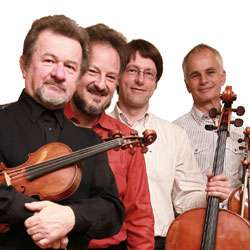|
Back
The Philosophers Sing New York
Weill Recital Hall, Carnegie Hall
10/12/2012 -
Wolfgang Amadeus Mozart: String Quartet in D Major “Hoffmeister”, K. 499
Witold Lutoslawski: String Quartet
Ludwig van Beethoven: String Quartet Nr. 10 in E-flat Major “Harp”, Opus 74
Philharmonia Quartett Berlin: Daniel Stabrawa, Christian Stadelmann (Violins), Neithard Resa (Viola), Dietmar Schwalke (Cello)

D. Stabrawa, C. Stadelmann, D. Schwalke, N. Resa
(© Daniel Hanack)
Forming a string quartet from the First Chair players of the Berlin Philharmonic Orchestra is like alchemizing a precious metal to give the very essence of gold. But this was the intention from the original four players of the Philharmonia Quartett Berlin in 1984. While the first cellist died three years ago, the four present players have that combination of absolute confidence and alacrity to make the concert last night an unchallenging delight for the full house audience.
The Weill Concert Hall venue has the classic chamber architecture, and two of the three works were of the most classic composers, so one didn’t expect any surprises. Though the work in the center was indeed a revelation. But starting with Mozart’s “Hoffmeister” Quartet gave an indication of the Quartet’s musical heritage.
The first movement was played with fizz and exuberance, while the so personal slow movement was given a performance of silken lines. Some of us like this music to slow down a second for the one harsh dissonance in the movement, but the Berlin group evidently felt this would take away from the lovely mood of the movement itself.
Beethoven’s “Harp” (for the first movement pizzicato) is a most ebullient piece, and the Berlin quartet didn’t need to push the composer’s fierce energy. The slow movement, was broad and unsentimental. Beethoven’s “presto” scherzo was more a tour de force, rather than a scherzo. So if it had the whizzing energy of a bagatelle, it gave way to some earthy lovely variations for the end.
The centerpiece of the evening was Lutoslawski’s only String Quartet, which I had previously heard only on recording. A live performance is absolutely essential. Think of it this way: four energetic brilliant philosophers are discussing a range of vital issues, each one of them giving brilliant answers–and each speaking at the same time.
That doesn’t sound very entertaining. But musically, Lutoslawski does exactly this. It isn’t exactly aleatory, since all the notes are written out, and each section is carefully delineated (after a purposely meandering introduction). But each of the four players can interpret each section at his own pace, with his own colorings, his own melodic lines. So while the piece on paper seems a fairly ordinary late 20th Century chamber work, one hears vibrations, subtexts, little disagreements, and–toward the end, the most stunning icy funeral march.
The Mozart and Beethoven were, of course, played with predictable beauty. But this Lutoslawski made the mind (and the ears) work double-time, where passive enjoyment was translated into absorbing excitement.
Harry Rolnick
|